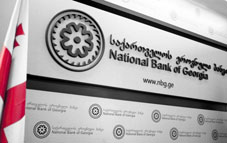
Georgian central bank raises monetary policy rate to 9.50%
By Khatia Bzhalava
Thursday, April 29
The Monetary Policy Committee (MPC) of the National Bank of Georgia (NBG) has decided to raise the refinancing rate by 1 percentage point to 9.50%.
According to NBG’s statement, the annual inflation reached 7.2 percent in March. The NBG explains that the reduction of inflation since last December was related to the subsidization of utility fees, however, ending the subsidy in March 2021 reflected in the upward shift of inflation. According to the updated forecast, the inflation rate will average at around 6.5% throughout 2021, before approaching the target, which is 3%. NBG notes that the forecast for economic growth is about 4 % in the baseline scenario.
According to the statement, pressure on inflation is mainly coming from rising prices on international commodity markets, which is being reflected in the increased prices for oil products and selected food items, and the high dollarization of the economy. The NBG also names the high uncertainty around the tourism industry amid deteriorating epidemiological conditions as one of the key factors pressuring inflation upward.
“Given the prolonged deviation of inflation from its target and intensified inflationary pressures, the Committee decided to increase the monetary policy rate by 1 percentage point. A possible further tightening of monetary policy will depend on inflation expectations and the dynamics of factors affecting it,” the statement reads.
According to the bank, the pressure on inflation coming from high dollarization and the exchange rate is still strong. In addition to limiting the efficiency of monetary policy, dollarization also carries risks of financial stability, therefore, its reduction remains a long-term priority. As NBG said, for this reason, starting from July, the minimum reserve requirements for funds attracted in a foreign currency will be determined individually, for each commercial bank, according to the dollarization of deposits.
“In particular, unless the deposit dollarization rate exceeds 40 percent, the reserve requirement norm will be reduced from 25 to 10 percent for funds borrowed in a foreign currency and with a remaining maturity of up to 1 year. If the deposit dollarization is 70 percent or above, reserve requirements will still be 25 percent,” NBG noted adding that If a bank’s deposit dollarization lies within 40-70%, the reserve requirement will be decreased linearly from 25% to 10% in correspondence to a decrease in dollarization.
NBG believes that this change will support increasing the demand for GEL and easing the pressure on the foreign exchange market.


